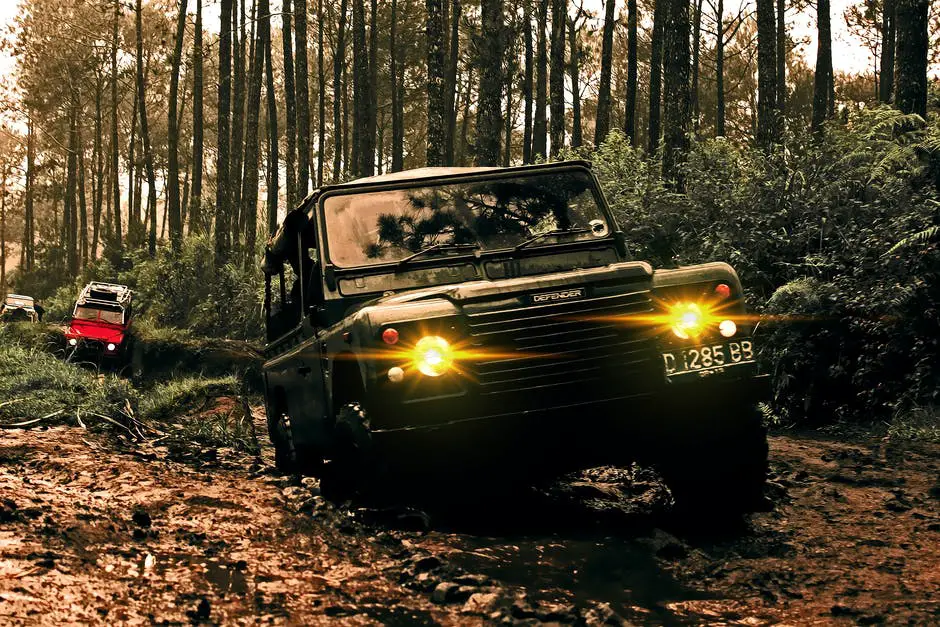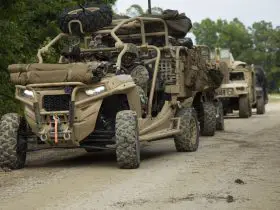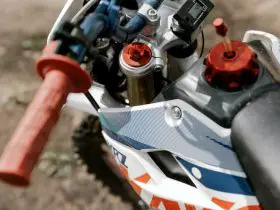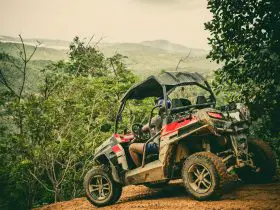When you think about off-roading, what comes to mind? For some people, it’s a full-sized vehicle such as a Jeep. For others, it’s a smaller utility vehicle, such as a UTV.
Both can be used for similar purposes, but Jeeps and UTVs are not one and the same. They are unique vehicles each geared toward different purposes.
UTV vs Jeep, which should you choose? Jeeps can easily conquer rough terrain on the weekend, while still providing you with daily transportation around town during the week. UTVs on the other hand, can’t be used on public road systems and are limited to dirt trails and private property.
However, there are many reasons one would prefer a UTV for their off-road needs over a larger vehicle like a Jeep.
So the debate goes on. Jeep vs UTV; which should you choose and when? Keep reading to learn the differences between UTVs vs Jeeps in order to find out which vehicle is right for you.
Table of Contents
UTV vs Jeep: Off-Roading Potential
The most common reason for a UTV and Jeep comparison is the desire for an off-road vehicle. Both Jeeps and UTVs can handle off-roading with ease and style.
However, there are many dirt roads and trails that favor one type of vehicle over the other.
Trail systems that aren’t adjacent to your property will require you to drive on public roads in order to get there. A Jeep is capable of riding on the road and then driving on the trail, making it simple to go from pavement to dirt.
With a UTV, on the other hand, you would need to haul it in a trailer and tow it to the trail system you want to explore.
On OHV trails, you can always use a UTV. And in most cases, unless otherwise noted, you should be able to drive a Jeep on OHV trails, as well. However, some trails can be very narrow or covered with thick brush.
The larger profile of a Jeep may find it difficult to navigate certain trails, and a smaller UTV would be a better option.
Public Road Use
One of the biggest differences when comparing Jeeps to UTVs is the fact that Jeeps are legally allowed to drive on public, paved roads, while UTVs are not.
UTVs are specifically titled off-road vehicles. They lack many of the basic safety features necessary for use on the highway, alongside full-sized vehicles. In some states, however, there are certain UTVs that you can modify in order to make street legal. But this is the exception, not the norm.
In this case, Jeeps are more versatile, since you can use them both on the road and the trail.
Jeep vs UTV: Utility and Function
Another reason for comparing UTVs and Jeeps is for a vehicle that can serve a practical purpose. If you own a large property, you’ll likely need a vehicle with four-wheel drive that can operate on dirt, and in wet and snowy conditions.
If you own a farm or run a business on your property, you may need to tow trailers and move lots of gear around. Both Jeeps and UTVs are well-suited to this purpose.
If you have a Jeep Wrangler or Grand Cherokee, you can typically tow between 2,000 and 7,000 lbs. Most UTVs are capable of towing between 1,000 and 2,500 lbs, with some specialized models capable of pulling a total of 3,000 lbs.
And while Jeeps generally offer some trunk space for storage, they aren’t really designed to carry a lot of gear. Rather, most of the interior space inside a Jeep is intended for passengers.
Even though UTVs are much smaller than Jeeps, they offer tons of storage space. You can choose a model with a bed on the back, which usually has load capacities of around 1,000 lbs.
These can carry much larger items that wouldn’t fit into the trunk of a Jeep. Most UTVs also offer plenty of interior storage, with under-seat compartments and other creative storage options.
Since the goal when managing a property or farm is to get work done, most people would prefer the functionality offered by a UTV over the comfort and additional seating afforded by a Jeep.
Hunting
One of the most popular ways to use a UTV is while hunting. Their low profile makes it easy to scout the property, carry gear, hang treestands, and check trail cameras. And of course, they will help you eventually pack out an animal.
But since they can’t be used on public roads, they are best suited for those who own their own hunting property, have access to private land near their primary residence, or live within a National Forest. If you don’t and you need to drive to a parcel of public land, a Jeep will serve you better.
Also, since most UTVs are gas-powered, they are generally just as loud as Jeeps and other vehicles. So be cautious when operating near your hunting location.
Cost of UTVs vs Jeeps
When looking for a small vehicle to use around their property, people often compare the cost of a golf cart and a UTV. While golf carts can be useful to navigate large properties, they often don’t have the storage or towing capacities needed to actually get work done.
Both UTVs and Jeeps, on the other hand, offer tons of functionality when managing your property, but they come in very different price tags. For a brand new Jeep, you can expect the price to start around $30,000. The nicest, most advanced UTV will likely top out around $30,000, with entry-level models starting around $5,000.
So if you don’t need a vehicle that can operate on public roads, UTVs are much more affordable.
UTV vs Jeep: What’s Most Important for You?
UTV vs Jeep, how do you choose what’s right for you? It comes down to what is most important.
If you want the most versatile option, that can be used on both public roads, so you can drive to work, as well as off-road on the trails, a Jeep is the better option. However, they are much more expensive to buy and maintain.
If you don’t need to drive on public roads and want something more affordable that can be ridden on trails as well as your own property (without causing too much damage), a UTV is the better choice.
Are you leaning towards a UTV vs Jeep? Check out this article to see why UTVs are worth the money.










